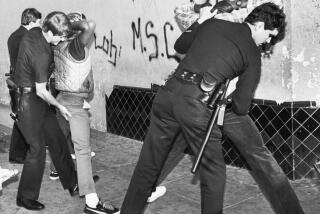No on Measure A
Los Angeles was once a great place to grow up, and it wasn’t just because of the sunshine and the beach. Kids here enjoyed a great public school system, true, but it was more than that. They had an infrastructure of first-rate libraries, organized after-school activities, safe parks, job-training programs and community service projects. The city’s best-known contributions to the world were healthy, well-educated, successful young people. Gang life beckoned to some, but youths who wanted to stay out of that life generally could. There were options.
But over the course of three decades, the city, county, state and federal governments have systematically defunded children and young adults. Occasional successes, such as boosting library hours, have been more than matched by cutbacks in supervised recreation and other areas. Great programs such as L.A.’s Best are available to only a few. At the same time, families that once had the reliable paychecks and solid medical plans that allowed them to devote necessary attention to their kids now are left to struggle alone when the economy takes a nose-dive or healthcare becomes unaffordable.
Violent crime has dipped in recent years, but gang membership has remained high. The size of youth gangs and the pervasiveness of gang culture set Los Angeles apart from other cities. Gangs are L.A.’s best-known export. There can be little doubt that the city would be a better place to live if the public once again insisted that it become better known for the support it gives its youth than as the world headquarters of gangs.
So when City Councilwoman Janice Hahn comes forward with a ballot measure to raise millions of dollars for programs to divert youth from gangs -- as city Measure A promises to do, with a $36-per-year tax on each parcel or property -- how can The Times say no? Yet we do say no, with regret but with conviction. Here’s why:
For more than a decade, the city ran gang prevention and intervention programs under the L.A. Bridges banner, using contractors that operated with minimal scrutiny and no evaluation. Did they really keep kids out of gangs? Did they really prevent violence? Were the most capable providers the ones getting the contracts, or were they simply the ones best connected with politicians? No one knows. Then-City Controller Rick Tuttle said L.A. Bridges should be scrapped and replaced, but his report was shunned by the political establishment, which seemed to be more interested in appearances than in results. To further burnish the appearance that the city cared about its youth, every program at every city park that could conceivably be depicted as an alternative to gang life was trumpeted as just that. No change from City Hall -- except in marketing its image.
Things began to change over the last year. After a scathing and exhaustive report by Advancement Project co-director Connie Rice, and at City Controller Laura Chick’s urging, Mayor Antonio Villaraigosa scrapped L.A. Bridges, pulled anti-gang programs under his direct authority and vowed to make sure that each program was funded on its merits and evaluated on its results. His point person on gangs, Jeff Carr, signaled a new direction when the first round of new contracts was awarded. It wasn’t just the same old L.A. Bridges contractors under a new umbrella.
But nothing real has actually happened yet. No evaluators have been hired, no evaluations have been completed, no evidence yet shows that the city has turned a corner. It is far too early to add new taxpayer funding to programs that may or may not work. It would be like trusting that a drug-dependent friend has kicked his habit based on only his promise, before he has even completed his first stint in rehab. We want so desperately to believe him -- but must not, for his own good as well as ours.
Some who know City Hall well argue that it will never get its act together, and that we must begin helping kids today, even if much of the money is wasted. But we are far more optimistic about democracy than that. We believe, we insist -- we demand -- that government can spend tax dollars wisely to help build a strong and healthy society. Part of that belief is the equally adamant demand that government demonstrate its ability. City Hall may be on a path to doing that, but the path is long, and the city has taken only its first step. The mayor and the City Council are facing a tough budget year, but they do have the power to direct more funding to youth and anti-gang programs. When they are successful, the city will insist on backing them up with financial support.
More to Read
A cure for the common opinion
Get thought-provoking perspectives with our weekly newsletter.
You may occasionally receive promotional content from the Los Angeles Times.






